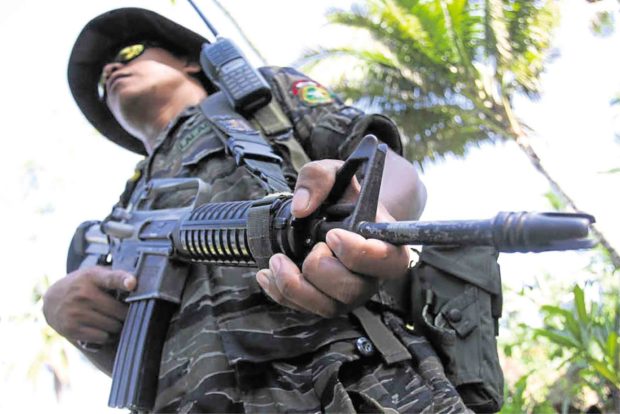
Taking part in President Duterte’s war on drugs will be the new role for members of Moro Islamic Liberation Front (MILF), like this rebel in an MILF camp in Maguindanao. —JEOFFREY MAITEM
DAVAO CITY — Members of a Moro rebel group covered by a truce with the government had approved a set of procedures that formalized their role in the Duterte administration’s war on drugs, signing an agreement to arrest drug suspects in rebel camps and turn them over to government law enforcers.
Isidro Lapeña, chief of the Philippine Drug Enforcement Agency (PDEA), said representatives of the Moro Islamic Liberation Front (MILF) on Friday signed a protocol of cooperation on antidrug operations that Lapeña said was a fulfillment of the MILF’s offer to help in the war on drugs.
“There was an offer by the MILF to help so we have to involve them,” Lapeña said.
The signing by MILF and government representatives of the protocol came a year after President Duterte launched his bloody war on drugs.
Shortcuts
The protocol, Lapeña said, would allow shortcuts to be taken in procedures governing law enforcement cooperation stipulated by the Ad hoc Joint Action Group (Ahjag).
Ahjag is a body that monitors law enforcement operations in rebel areas or involving rebels with the main objective of preventing unnecessary clashes between rebels and soldiers.
The protocol would allow antidrug operations in areas controlled by MILF to proceed “more expeditiously,” Lapeña said.
“What’s important here is the cooperation,” Lapeña said.
Rules stipulated by Ahjag would be used in antidrug operations with MILF help to avoid lapses that could lead to clashes between rebels and soldiers.
Also hurt by drugs
Acting Interior Secretary Catalino Cuy said the protocol was the result of a series of meetings between the MILF and the government, and considered necessary because MILF-held areas were also reeling from the drug menace.
In 2015, according to Cuy, the MILF already declared drugs “haram” or forbidden.
“The partnership aims to produce optimum results in the war on drugs,” said Cuy, a retired police general.
The protocol followed the signing in July 2016 of a pact on cooperation and coordination on antidrug operations by MILF and government representatives, Cuy said.
The protocol clearly defined the MILF role, he said.
“The support of the MILF just shows that we could be one in our common goal,” he said.
The protocol would allow the MILF to conduct “citizens’ arrest” of drug suspects in rebel territory, according to Lapeña. These arrested suspects, he said, would have to be turned over to government authorities.
Lawyer Abdul Dataya, Ahjag representative for MILF, said the rebel role was limited to coordinating with government forces and furnishing lists of drug personalities in rebel areas.
Direct role
Whether rebels would play a direct role in antidrug operations in MILF areas would be up to the government, Dataya said.
The protocol is key to preventing “misencounters,” he said.
Retired Brig. Gen. Pierre Bucsit, Ahjag representative for the government, said the protocol would lay out standard operating procedures in antidrug operations in MILF areas.
The MILF maintains camps in the Autonomous Region in Muslim Mindanao (ARMM), Central Mindanao, Western Mindanao and parts of Davao Oriental and Compostela Valley provinces.
In Maguindanao, Lapeña said drugs are rampant in 366 of 509 villages, or about 72 percent. In Lanao del Sur, including Marawi City, at least 313 of 1,059 villages are drug-influenced, he said. The two provinces are part of ARMM. —Frinston Lim